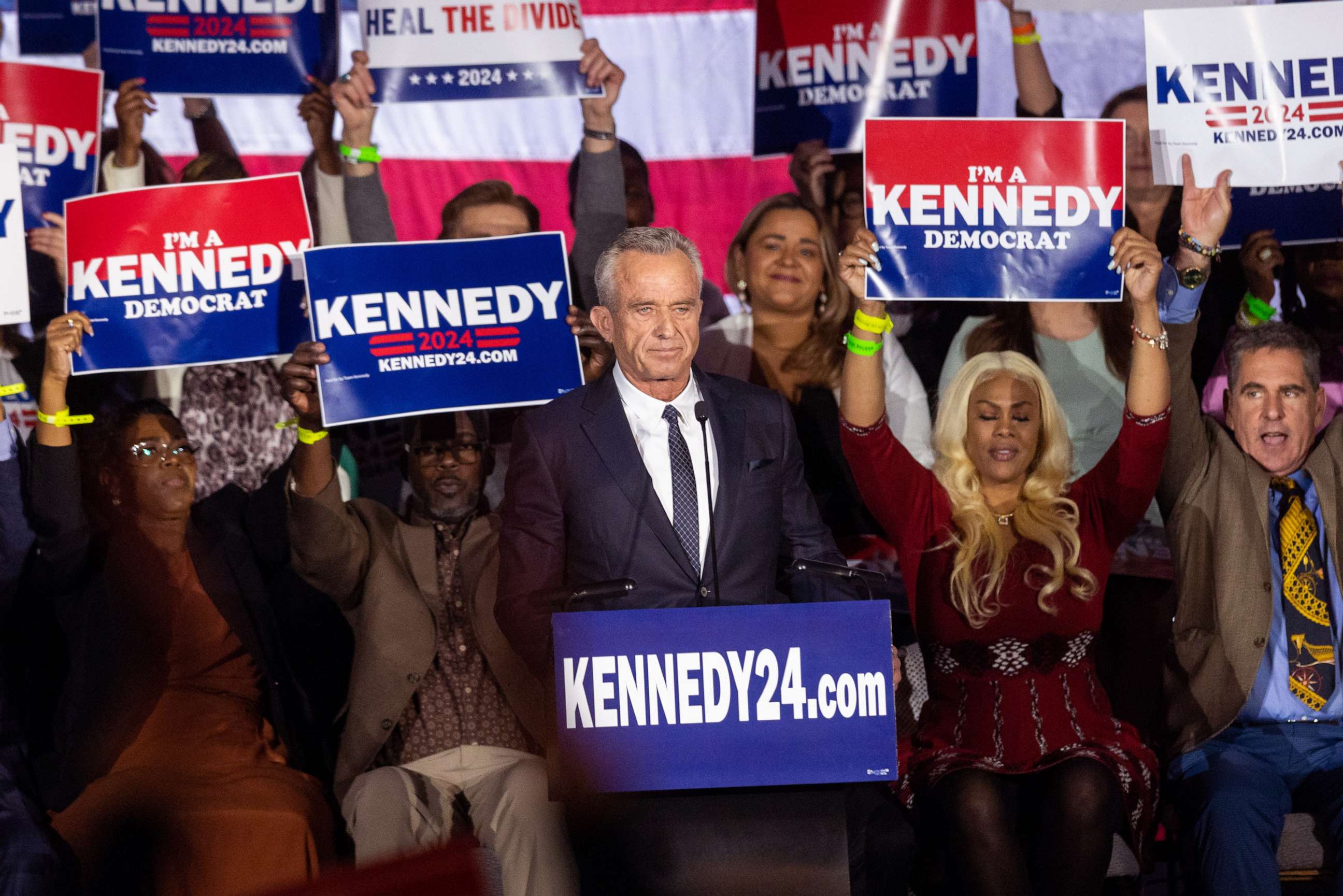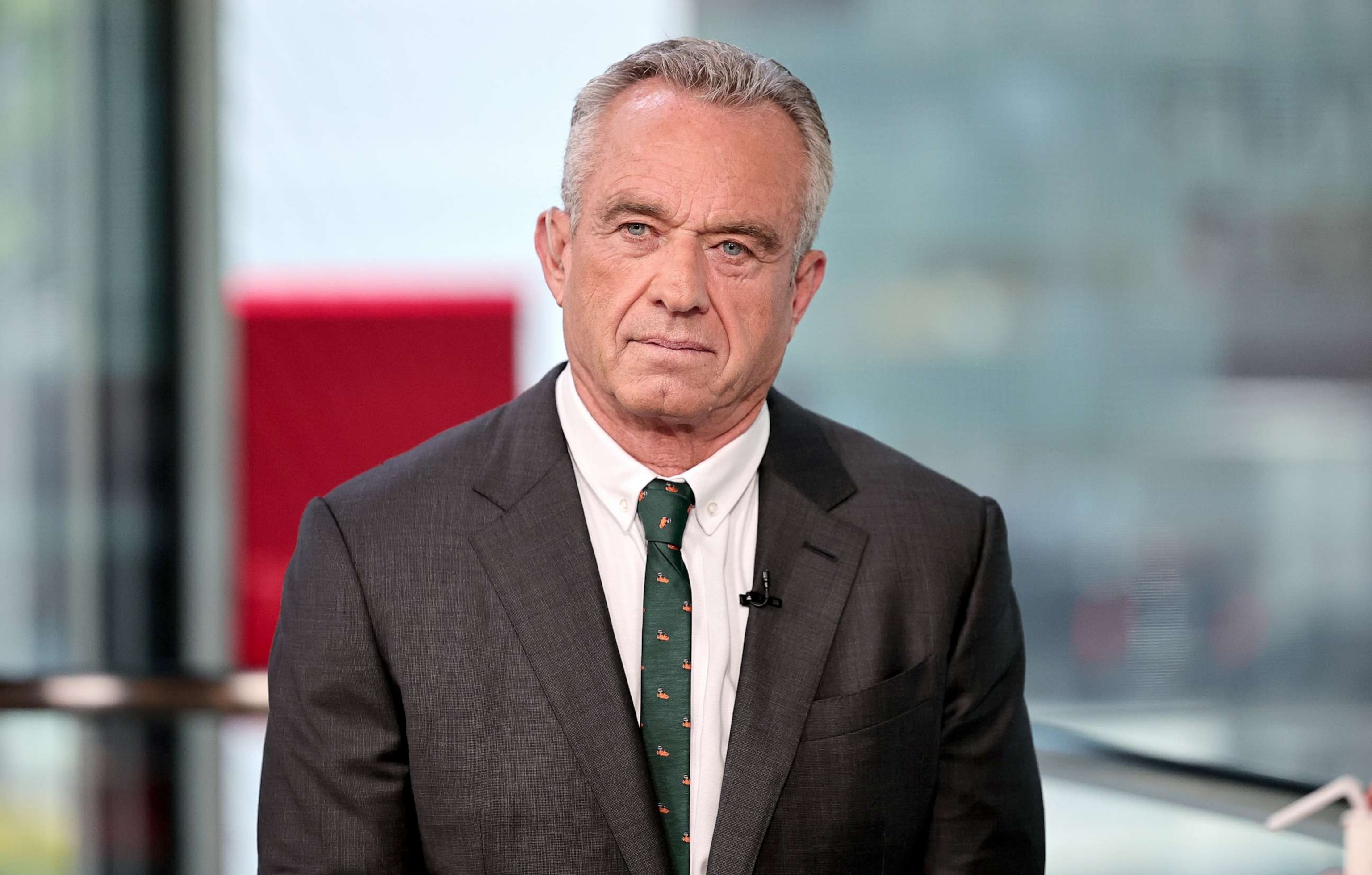What RFK Jr., now a presidential candidate, has said about Ukraine, vaccines, the economy and more
The long shot Democratic hopeful holds views at odds with others in his party.
Robert F. Kennedy Jr. spoke at Saint Anselm College in Manchester, New Hampshire, on Tuesday night in what his campaign billed as a major foreign policy address for the long shot Democratic presidential candidate.
He told the crowd that he believes the U.S. government bears some responsibility for Russia's invasion of Ukraine -- a view rejected by America and many Western countries -- and said that the "danger of reckless escalation and nuclear brinksmanship" was "real and present."
The son of former New York senator and U.S. Attorney General Robert F. Kennedy and scion of one of the country's most famous political families, the younger Kennedy has garnered widespread attention in recent months because of his bid to beat President Joe Biden in the Democratic Party's 2024 primary.
In addition to a string of high-profile media appearances, Kennedy has also registered some support in early polls so far: One survey from Quinnipiac University this month showed him at 17% versus Biden at 70%.
Tuesday's speech adds to Kennedy's array of policy positions and beliefs.
While his economic and environmental platform broadly aligns with other Democrats, some of his other views put him at odds with the party and, in the case of his criticism of vaccines, a majority of the scientific and medical community.
Foreign policy
On Tuesday night, Kennedy took direct aim at U.S. foreign policy while laying out his own global vision, calling the war in Ukraine a "creation of a relentless mentality of foreign domination" on the part of the United States and accusing the West -- without evidence -- of intentionally sabotaging peace talks in the spring of 2022 and, more specifically, claiming the U.S. wants to remove Russia's authoritarian president, Vladimir Putin.
"I abhor Russia's brutal and bloody invasion of that nation," Kennedy told the crowd. "But we must understand that our government has also contributed to its circumstances through repeated deliberate provocations of Russia going back to the 1990s."
At times, he leaned heavily on the foreign policy legacy of former President John F. Kennedy, telling attendees that nuclear tensions are on the rise today as in the time of his uncle, but that there is an opportunity "to take a radically different path, a path towards peace."
Kennedy has been a frequent critic of America's involvement in supporting Ukraine from Russia's invasion, which he has repeatedly referred to as a "proxy war" that he claims, as he wrote on Twitter this week, is being fought "all for the sake of U.S. (imagined) geopolitical interests."
"They wanted war as part of their strategic grand plan to destroy any country such as Russia that resists American imperial expansion," Kennedy tweeted in May, launching into a critique of the Biden administration. "They only pretend to think it was unprovoked. They are lying to us, manufacturing consent for war."
That view has been broadly rejected by leading politicians on both sides of the aisle as well as America's military leaders.
"The United States continues to stand with the people of Ukraine, whose enduring courage and solidarity inspires the world," Secretary of State Antony Blinken said in a statement last week, adding, "Russia could end [the war] at any time by withdrawing its forces from Ukraine and stopping its brutal attacks against Ukraine's cities and people."

The economy
In a June interview on the "Breaking Points" podcast, Kennedy said that his "primary platform" on the economy would be cutting military spending and reinvesting that money into domestic spending and development.
"My primary platform is to cut the costs on the military," Kennedy said on the show. "Again, what we were told was a peace dividend after the collapse of the Soviet Union. … We were going to cut our military budget from about $600 billion a year to $200 billion a year."
On his website, Kennedy lists rebuilding industrial infrastructure "ruined by forty years of off-shoring" among his top priorities, alongside "government assistance to the nation's most vulnerable."
He expressed hesitation, though, when asked if he would support a federal jobs guarantee or a universal basic income.
"I need to look at those things, you know, and see, and I need to talk to a lot of economists and talk about the ups and downs of those issues," he said. "You know, I can see a lot of problems with those issues, which I think are obvious to anybody. And it's a real departure from American free market capitalism. I'd like to try to give this system a chance to work."
On raising the federal minimum wage, Kennedy said he did not have a specific number in mind but that "people should have a living wage in this country."
"Thirty-five percent of Americans … are not making enough money to pay for basic human needs, and that means food, transportation and housing," Kennedy said on the podcast. "And that means those Americans are sitting on the precipice of a cliff, that they're inches away from, or on top of, becoming homeless."
He has also expressed support for bolstering unions: "We need to build rebuild unions in this country, because it's one of the key ways we can counterbalance … the domination of our government by corporate power."
The environment
An environmental lawyer by trade, Kennedy has positioned environmental policy as a centerpiece of his presidential bid.
"In 100% of the situations, good environmental policy is identical to good economic policy," Kennedy told a crowd of supporters when announcing his presidential run in April. "If we want to measure our economy, this is how we ought to be measuring -- based upon how it produces jobs and the dignity of jobs over the generations and how it preserves the value of the assets of our community."
Kennedy has also promised, if elected, to protect wild lands by curbing logging, oil drilling and mining and containing suburban sprawl.
"We will become a global advocate for rainforest preservation and marine restoration," his campaign website states. "We will rethink development policies that promised economic growth while ignoring ecological sustainability, and ended up delivering neither."

Vaccines
In 2005, in a since-debunked story in Rolling Stone and Salon called "Deadly Immunity," Kennedy falsely asserted a link between childhood vaccines and autism via a mercury-based compound called thimerosal, which the Food and Drug Administration phased out of nearly all vaccines in 2001. The article was amended with five separate corrections before being fully retracted.
Research has repeatedly shown that vaccines and their ingredients, including thimerosal, do not cause autism. According to the Centers for Disease Control and Prevention, nine CDC-funded or conducted studies have "found no link between thimerosal-containing vaccines" since 2003.
Six years later, Kennedy founded the Children's Health Defense, a prominent anti-vaccine nonprofit that has campaigned against immunizations and other public health measures like water fluoridation.
After the start of the COVID-19 pandemic, the group held rallies to protest restrictions aimed at stemming the spread of the virus.
It was at one of those events where Kennedy, appearing alongside vaccine opponents and others in front of the Lincoln Memorial, compared the restrictions to Nazi Germany: "Even in Hitler's Germany, you could cross the Alps to Switzerland. You could hide in an attic like Anne Frank did."
He later apologized for the remark, saying, "My intention was to use examples of past barbarism to show the perils from new technologies of control. To the extent my remarks caused hurt, I am truly and deeply sorry."
His anti-vaccine views gained traction with some during the pandemic. Filings with charity regulators show Children's Health Defense saw revenues double to $6.8 million in 2020.
Kennedy has also attracted a growing base of support among far-right figures like InfoWars host Alex Jones and former Trump adviser Steve Bannon, who have spread falsehoods about the COVID-19 pandemic or the 2020 election.
So far, the 69-year-old environmental lawyer has shown no sign of softening his views on the issue, often reposting articles from his nonprofit on Twitter and appearing as a guest on podcasts like "The Joe Rogan Experience," where last week he falsely claimed that ivermectin, a de-worming drug, was suppressed by the FDA so that specialized COVID-19 vaccines could receive emergency use authorization.
Last week, he tweeted that as president he would "hold the agencies and individuals responsible, and we will compensate the vaccine injured."
Some experts have expressed concern about Kennedy's vaccine skepticism and misleading claims about COVID-19.
Dr. Nick Sawyer, an emergency medicine physician in Sacramento who founded No License for Disinformation, a group of doctors who came together during the pandemic to call on state medical boards to take disciplinary measures against doctors spreading misinformation, previously told ABC News that Kennedy represents "a huge threat."
"He's lying to people about critical things that have to do with our nation's children's health," Sawyer said. "The health effects are incredibly dangerous and have already shown to be incredibly damaging."
Meanwhile, Kennedy has largely shied away from addressing the issue of vaccines on the campaign trail. In his nearly two-hour-long campaign announcement, he made no explicit mention of them and told NBC News in a recent interview that while he's not leading with the issue, "If anybody wants to talk to me about vaccines, I'll talk to them."
The border
On Twitter, Kennedy has billed himself as both in favor of immigration and "closing the border."
Visiting Yuma, Arizona, in early June, Kennedy called the rate of unauthorized migration "not a good thing for our country" and said it was "unsustainable."
"This is a humanitarian crisis because of the understanding across the globe that we now have an open border here," he said in a video. "There are people being drawn here. They're being abused. There's all kinds of horrific, terrible, terrible stories."
At the same time as Kennedy’s visit, the Department of Homeland Security reported on June 6 that unlawful entries along the southern border had decreased 70% from their record highs since the end of Title 42 on May 11.
"America should be a haven of freedom and prosperity, open to law-abiding migrants who will contribute to our society," Kennedy said in May. "However, immigration must proceed in an orderly, lawful manner."




